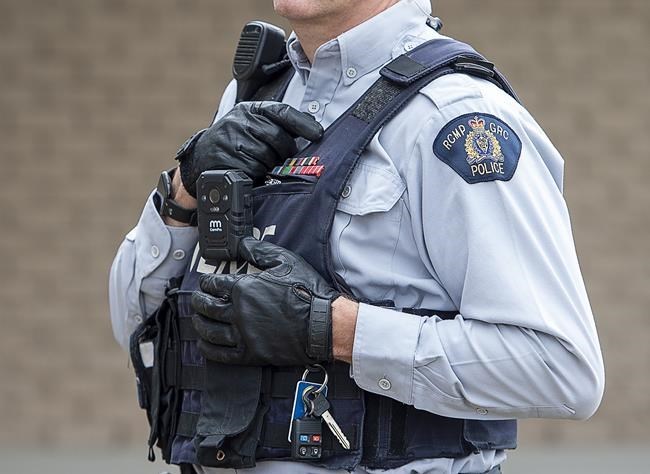CALGARY — A criminologist says Alberta's plan to make all police services in the province use body cameras could come with prohibitive costs and take a long time to put in place.Â
Public Safety Minister Mike Ellis announced Tuesday that body cams would protect officers and the public, and help make decisions made by police officers more transparent.Â
The United Conservative Party government will work with the Alberta Association of Chiefs of Police on funding, logistics and when the cameras will roll out, he said. It's expected to be another three or four months before a draft proposal is ready. There was no immediate estimate on how much the plan would cost.Â
Doug King, a justice studies professor at Mount Royal University in Calgary, said body cameras are a good idea, but there are questions that need to be answered, including who would pay the high cost of storing the video footage.Â
"It can be prohibitively expensive," King said Wednesday. "That's a heck of a lot of storage space that has to be maintained."
"You can't then dump it on a town like Taber, Alta., that has 26 officers and say you're going to have to do this. We're going to mandate it but we're going to leave you holding the cost of it."Â
King said it looks as though everyone is on board with the plan but thinking that every police service in Alberta will be adopting the cameras any time soon is unrealistic.Â
"That's foolish. It's going to probably take two or three years to get these things implemented across the board."Â
Ellis has said Alberta's plan doesn't include the RCMP now, but there are indications there is support for body cams at the federal level.Â
"I do know that Public Safety Canada and actually the prime minister had, during an incident not too long ago, wanted to have body-worn cameras for all police officers in Canada," he said.Â
Cpl. Gina Slaney, an RCMP spokeswoman, said steps are being taken for some Alberta Mounties to start using body cams.Â
"The RCMP in Alberta are about to start trials with body-worn cameras so we don't have very many details yet," she said. "We're doing these trial runs in three different locations in Alberta … Grande Prairie, St. Paul and Parkland.Â
"We're totally in support of it."Â
Khor Top, a spokesman for Calgary's South Sudanese community, said he has mixed feelings about the cameras, noting some people have had a fractious relationship with police.
"I think it's a great idea to have body cameras to deter and overcome some of the issues or actions that might lead to an escalation in some sense," said Top, the executive director of the Komkan Africana Institute.
"On the other hand, I think it's not enough because of how Black community members are feeling about the way the police treat them or the way the police look at them and consider them as thieves, consider them as criminals before any incident."
Veteran Edmonton criminal trial lawyer Tom Engel called the announcement good news for police accountability and the criminal justice system, but he said there are still questions to be answered.Â
"When? How? Who's paying for it?" Engel said.Â
Engel, the chair of the Criminal Trial Lawyers Association Policing Committee, said they have been advocating for body cameras for a long time.Â
"It came out of the blue to me. It's good to see the minister just step up and say now we're going to do it at every police service in Alberta. Could this be something to curry favour amongst the electorate for the UCP? I hope not."Â
Engel said he will continue his fight to have in-vehicle audio and video equipment put in all police vehicles similar to what the Calgary Police and RCMP use.Â
First Nations police forces aren't under provincial jurisdiction, but Ellis said they will help work on the new body-cam mandate.
"As a self-administered Indigenous Police Service, our funding is quite limited and we are encouraged by the province's willingness to assist in the procurement, however, that may look," said Blood Tribe Police Chief Grant Buckskin.Â
"We support any initiative where we can further build trust within our community."Â
King doesn't expect to see other provinces follow Alberta's lead right away. He said British Columbia and Ontario have many municipal police bodies and might want to watch and see how things go in Alberta.Â
"I think in many ways Alberta is going to become, unintentionally, a pilot project."Â
This report by The Canadian Press was first published March 15, 2023.Â
Bill Graveland, The Canadian Press



